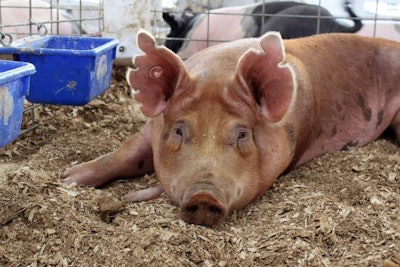
Antibiotic reduction and ingredient variability are two of the most pressing issues facing today’s swine nutritionists and feed producers. Several sessions at the FIAAP Animal Nutrition Conference, held June 14, 2017, in Cologne, Germany, will address these concerns.
Reducing and eliminating antibiotic use in pig feed
Purina Animal Nutrition’s Dr. Dari Brown will explore new alternative feeding strategies and related research for reducing and eliminating antibiotic use in pig feed during her talk, “U.S. strategies & research on antibiotic alternatives in swine diets.”
The U.S. FDA’s Veterinary Feed Directive (VFD), which bans the use of antibiotics for growth promotion in animal feed, has created a challenge for producers to be able to meet this demand in an economically feasible manner while preserving animal health and welfare. Therefore, alternative feeding strategies and novel technologies that have been and are being reviewed that could pose as an alternative approach and viable option for producers wanting to either raise pigs without antibiotics, or reduce the need to use antibiotics will be discussed. Brown will discuss a combination of solutions such as refining biosecurity and management procedures, refining farm antibiotic and vaccination programs as well as adopting new feed strategies and/or technologies to successfully raise pigs without antibiotics, or reduce the need to use antibiotics.
Feeding pre- and post-weaned piglets
Dr. Mike Varley, director of The Pig Technology Company, will explore the principles and practice of feeding pre- and post-weaned piglets, the elements of nutritional delivery and gut health management. Significant changes in these applications have altered feed ingredients utilized and the practice of formulation itself. The withdrawal of antibiotics, use of alternative energy ingredients and the introduction of novel protein and fiber sources offer nutritionists new opportunities and challenges. Varley will address these issues and speculate about the future of piglet diets in “Pre- and post-weaned piglet nutrition: a modern approach for tomorrow’s production landscape.”
Processed proteins and swine nutrition
From raw soybean to soy protein isolate, the various steps of processing affect the character of the end product. To understand the influence of the various steps in processing enables the feed formulator to better create a diet with the necessary dietary benefits for the animal in question. Digestibility of the protein is not merely a calculation factor to be used in formulation to obtain the correct level of digestible amino acids, but also a tool to reduce undigested protein and reduce gut health stress. This approach enables removal of causes for gut health issues, which in turn does not have to be treated by antibiotics or overcome by addition of other perhaps expensive solutions. During the presentation, “The effect of processed proteins on swine nutrition,” Lars Sangill Andersen, nutritionist, Hamlet Protein A/S, will discuss which approaches should be used when evaluating digestibility of raw materials for piglets.
For more information about the FIAAP Animal Nutrition Conference, to view the full agenda or to register for the event, visit www.fiaap-conferences.com.

















